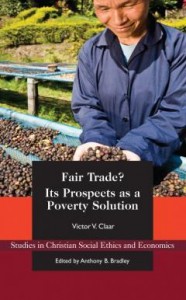The NYT Freakonomics blog notes that the Fair Trade movement does not exist independently of the laws of economics:
But the problem with Fair Trade coffee is that as the program scales up, the alternative market ethics it wants to sustain collapse. Inevitably, the Fair Trade market becomes subject to the same laws that drive the conventional commodities market. When the price of coffee drops, the appeal of Fair Trade’s price support lures growers into the cooperatives that sell coffee under the Fair Trade label. As poor growers rush into Fair Trade agreements, the supply of Fair Trade coffee rises. Protected by the price floor, the Fair Trade coffee remains inflated despite flagging demand. What Fair Trade importers thus end up doing with the excess Fair Trade coffee is dumping it—upwards of 75 percent of it!—on the conventional market.
This is a huge problem for Fair Trade. Essentially, to be successful, it must, as I have stated in the past, “argue for a complete standardization of its price-fixing methods.”
 This gets at the paradox of religious support for Fair Trade. It makes those who argue so vociferously against “consumption” as an evil, something that feeds the Big Ag “devil” (to use the Freakonomics blog’s terminology), instead rather promote and endorse consumerism of another kind: Fair Trade consumerism.
This gets at the paradox of religious support for Fair Trade. It makes those who argue so vociferously against “consumption” as an evil, something that feeds the Big Ag “devil” (to use the Freakonomics blog’s terminology), instead rather promote and endorse consumerism of another kind: Fair Trade consumerism.
That’s how you get to the point of mainline denominations pushing Fair Trade commodities (like coffee) in the church narthex and small groups, like moneychangers in the temple courtyard.
The Freakonomics post is lengthy and worthy of attention. But for a more comprehensive discussion of Fair Trade, be sure to check out the new monograph in the Studies in Christian Social Ethics and Economics series, Fair Trade? Its Prospects as a Poverty Solution.
In this book, Henderson State University economics professor Victor Claar examines the case of coffee in particular, and relates that in his
past place of worship, dedicated parishioners freely gave of their time and talents throughout the year to serve the retailing, advertising, and distribution efforts of Equal Exchange. Those parishioners who had taken on the ministry of fair trade coffee advertised frequently in the weekly bulletin and monthly newsletter—at no charge, of course. They also operated a coffee cart that was open for business between and after Sunday services, and they took great care to stock up on extra-special goodies in anticipation of gift-giving occasions such as Christmas and Valentine’s Day. They carefully maintained their inventory on hand, placing
orders with Equal Exchange when stocks were getting low. Of course, Equal Exchange was the only coffee served during coffee hour, where an Equal Exchange sign was prominently displayed to remind everyone that ours was a congregation that cared about the poor.
Claar concludes presciently: “In any other setting but a church, the message would be clear: If you enjoyed today’s free sample, be sure to pick some up on your way out to savor at home all week long.”
Order your copy of Fair Trade? Its Prospects as a Poverty Solution today.

